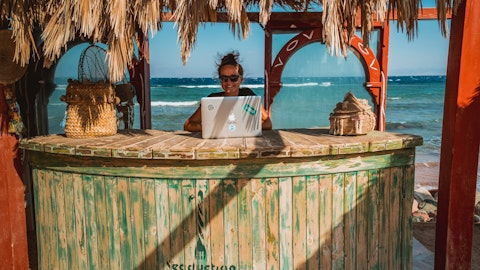Operator: Our next question comes from the line of Lauren Schenk.
Lauren Schenk: Great, thank you. I guess how should we think about ABV for the year? Is it safe to assume that you’re expecting that growth to continue to slow throughout the year but remain positive? And then maybe this is sort of a tougher question to answer, but what sort of travel backdrop are you assuming in the guidance range? Is it fair to assume, if you’re assuming some sort of recession, that your sort of travel outlook for €˜22 is below sorry, €˜23 is below €˜22. Thank you.
Aaron Easterly: Hey, Lauren, this is Aaron. So, with regards to the, let me take the first, the second part first, the travel outlook, we’re assuming mild to moderate recession. And what the travel impact you would typically see with that type of economic environment. I think the assumptions for the most part right now is that would probably impact lower to middle income people more than higher income people in terms of decisions to travel as well as trading down, it’s worth noting that we’re probably only really impacted to the degree that people decide not to travel versus they decide to take a cheaper flight or stay at a cheaper hotel or Airbnb. With regards to the first piece, we are expecting the ABV growth to slow down, but there are some things that could happen that might change that overall blended average, if we see more of a mix shift back to daytime services and dog walking, that could pull that down.
If we run experiments where it makes sense to show a different profile of service provider, that could have a mix shift on prices, but that is our baseline assumption. Charlie, would you like to add anything to that?
Charlie Wickers : Yes, just to wrap that up with Aaron. With regards to ABVs, to think about it from a modeling perspective, the rate of growth, we continue to assume that it’s going to decelerate, and it’s been decelerating now for about six quarters. So we would expect that to continue.
Aaron Easterly: But we wouldn’t expect it to be zero or go backwards in the case that we’re still operating in an inflationary environment.
Lauren Schenk: Okay, understood. And then just any changes that you’re seeing on the supply side from their side? Thanks.
Brent Turner : No, we still feel really good about where we are, Lauren. The supply strategy that we’re doing across all the services, we continue to tweak it and refine it, but nothing fundamentally different. And no pressure.
Operator: Our next question comes from the line of Eric Sheridan with Goldman Sachs.
Eric Sheridan: Thank you for taking the questions. Maybe two that I think are follow ups to things that have been asked. But during the prepared remarks, you sort of teased out the idea of a broader set of potentially industry partnerships when you think about go to market strategies. Would you be, I know nothing to announce today, but would you be trying to attempt to sort of lower acquisition costs? Would this be attempted to try to a greater degree monetize the existing user base? How should we think about what the end goals would be of those types of partnerships so we can understand what you’re trying to solve for necessarily, that’s number one? And then you’ve referenced, as we have on prior calls, elements of the travel industry.
Have you seen anything with your own booking window where there could be either earlier or greater length of the booking window than you’ve seen before, where bookings are happening earlier in advance because of travel plans and/ or that the dates of bookings could actually be longer than you’ve seen in prior periods and might run counter to normal seasonality? Thanks.



